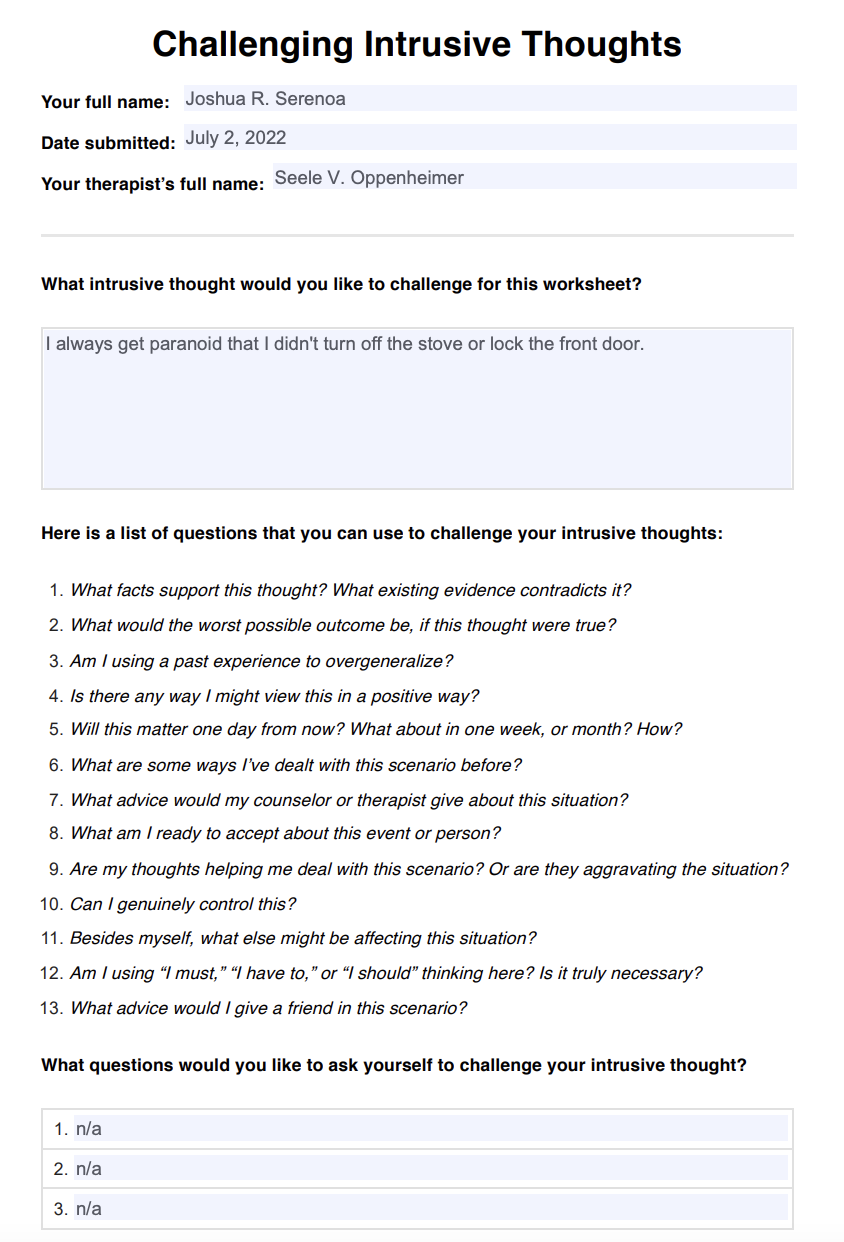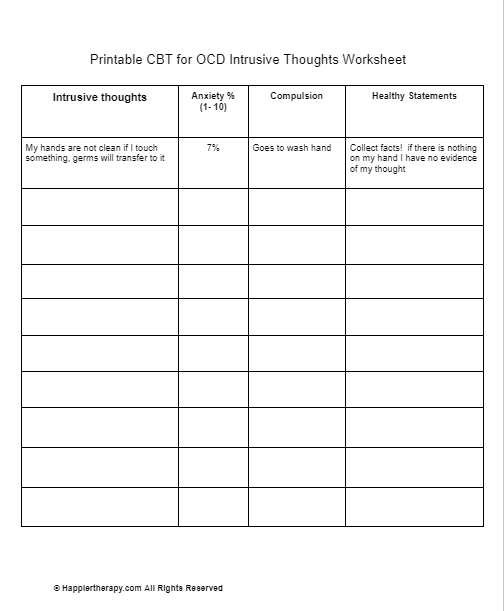Top 5 Intrusive Thoughts Worksheets for Managing Anxiety

The Power of Intrusive Thoughts Worksheets in Managing Anxiety

Anxiety is a common mental health issue that can take on many forms. Among the myriad of techniques available to manage it, intrusive thoughts worksheets have proven to be remarkably effective. These tools help individuals confront, understand, and mitigate the impact of intrusive thoughts, which are often distressing, repetitive, and seemingly uncontrollable thoughts. Here, we will explore the top 5 intrusive thoughts worksheets designed specifically for managing anxiety.
1. The Worry Time Journal

The Worry Time Journal is a structured approach to segregating your day into periods where you can focus on your worries without letting them disrupt your entire day.
- How it works: Allocate a specific time, usually 20 minutes, to write down all your intrusive thoughts.
- Benefits: Helps compartmentalize anxiety, increases self-awareness, and reduces the frequency of intrusive thoughts by knowing there’s a designated time to deal with them.
📝 Note: Don’t worry about writing well; focus on transferring your thoughts from mind to paper.
2. Thought Record Sheet

Thought Record Sheets assist in tracking thoughts in real-time, allowing you to recognize patterns and challenge distorted thinking.
- Columns Include:
Situation What event triggered the thought? Thought What was the intrusive thought? Feeling How did the thought make you feel? Emotion Rating Rate the intensity of the emotion from 1-10. Evidence List evidence supporting or refuting the thought. Alternative Thought Propose a healthier or more realistic thought. 
- Benefits: Recognizes cognitive distortions, promotes cognitive restructuring, and empowers the individual with coping skills.
3. Cognitive Distortions Log

Understanding cognitive distortions is key to managing anxiety. This worksheet helps to identify and reframe these distortions.
- Cognitive Distortions:
- Black-and-White Thinking
- Overgeneralization
- Mind Reading
- Catastrophizing
- Process:
- Identify a distressing thought.
- Label the cognitive distortion.
- Reframe with a more balanced perspective.
💡 Note: Regular practice can significantly reduce the power of these distortions over time.
4. Intrusive Thoughts Tracker

The Intrusive Thoughts Tracker is designed to monitor the frequency, triggers, and patterns of intrusive thoughts over time.
- Tracking:
- Date and Time
- Thought Description
- Trigger or Context
- Reaction or Feeling
- Response or Coping Strategy
- Benefits: Establishes a baseline for thought patterns, identifies triggers, and tracks progress in managing thoughts.
5. Mindfulness Log

Introducing mindfulness into the equation can be a game-changer when dealing with anxiety. This worksheet fosters a non-judgmental awareness of thoughts.
- Purpose: To develop a habit of observing thoughts without reacting or getting entangled in them.
- Sections:
- Date
- Mindfulness Practice
- Thought or Feeling Noted
- Reaction or Lack Thereof
- Reflection
🌱 Note: Mindfulness is not about emptying the mind but about learning to live with thoughts more harmoniously.
Incorporating these worksheets into your anxiety management toolkit can offer structure, insights, and strategies for navigating intrusive thoughts. Through consistent use, you can learn to recognize triggers, reframe thoughts, and foster a more peaceful relationship with your mind.
To wrap up, the journey through managing anxiety with intrusive thoughts worksheets is one of self-discovery and empowerment. Each worksheet provides a lens through which to view our thoughts differently, enabling us to take back control, challenge distortions, and cultivate a more mindful existence.
Can these worksheets replace therapy?

+
No, while these worksheets are valuable tools, they should complement, not replace, professional therapy. Therapy provides personalized support and strategies tailored to your needs.
How often should I use these worksheets?

+
Start with daily use, especially during periods of heightened anxiety. As you become more accustomed to the process, you might use them less frequently but still as needed.
What if writing down my thoughts feels overwhelming?

+
It’s normal to feel overwhelmed initially. Start with small, manageable time periods or use bullet points rather than detailed descriptions. Gradually increase your engagement as you feel more comfortable.